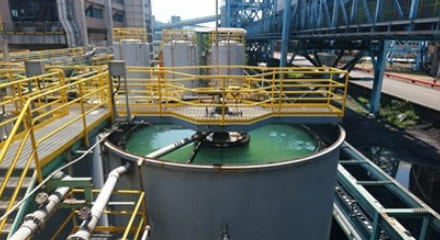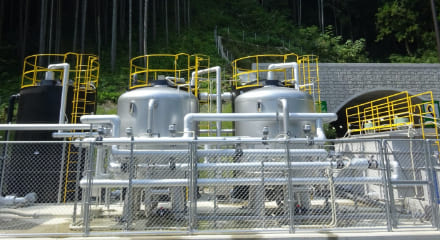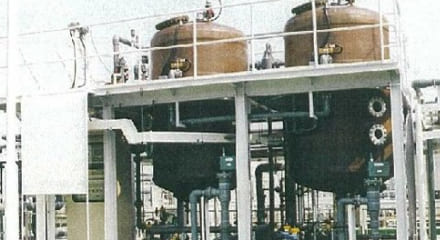FAQs
FAQs for adsorbents & flocculants READ for water treatment.
ー You can narrow down the questions to the information you want know.
About adsorbents of READ water treatment technology
01
Q.What can the READ series of adsorbents adsorb?
They can adsorb inorganic anions. They do not adsorb non-ionic substances such as organic substances or complexes.The Air Water Group focus on fluorine, boron and arsenic which includes in the water quality standards.
Q.Where can it be used for water treatment?
They are used to treat a wastewater from factories, offices and tunnel excavation sites.Some products are certified as the water supply materials and equipment which can be used at restaurants to purify potable water.However, you need to pretreat the water-containing suspended solids (hereafter, SS) to prevent net clogging and/or drift.
Q.At what concentration of the adsorbents can be used?
The treatment concentration differs along with the quality of raw water. Although, fluorine, boron and arsenic can be treated to a level that meets the wastewater and environmental standards specified by law. However, there is an upper limit to adsorption capacity. We recommend that any substance that exists in high concentration in the wastewater should be reduced to an appropriate level with pretreatment procedures such as coagulation sedimentation. For the specific applicable concentration depends on processing conditions, please feel free to contact us.
Q. How long can an adsorbent be used?
Basically, the service life of adsorbent for five to seven years, though it depends on the status of use. When the adsorption capacity has been saturated (reached at the breakthrough point), a regeneration treatment restores adsorptivity and enables to use of the product repeatedly. The time to the breakthrough point may fluctuate depending on processing conditions and design, please feel free to contact us.
Q. What should we be careful about when using adsorbents for arsenic, “READ-As”?
(1) Basically, ensure that the SV during percolation does not exceed ~10 per hour. When SV is higher than a certain level, the product performance gets lower. Also, the treatment may not be able to keep up and the concentration of treated water may not drop to the prescribed level even if a breakthrough point has not been reached.
(2) Inhibitory components, adding phosphate ions to the percolation liquid allows them to adhere to the resin and may cause the deterioration of adsorptivity. If the concentration is too high, we recommend to remove it in the preceding process.
(3) A pH percolation liquid, between five and ten is treatable, however, the lower the pH will exhibit the performance level. Therefore, adjusting pH can extend the time before regeneration.
(4) Adjustment before use, the conditioning necessary for the ion-exchange resin is performed at the time of shipment from the factory.You don’t need to condition it again, but the backwashing should be performed that not to take in air or SS component when filling the tower.
(5) SS component, it lead to clog resin and occurs drift which will cause a fragmentation resulting from the consolidation or compression of the resin. If there is a large volume of SS component, some measures need to be taken. Fe example, increase the frequency of backwashing and add some treatment process in the pretreatment such as sand filtration.
About flocculants of READ water treatment technology
02
Q. What form does the flocculant come in?
READ-CX flocculants are liquid type.
Q. What type of wastewater does it effectively treat?
READ flocculants can effectively treat the wastewater containing boron, fluorine, arsenic, phosphoric acid, copper, lead, selenium and hexavalent chromium.It can be used in the treatment of wastewater from coal-fired power stations, plating and semiconductor plants and other sources.
Q. How are READ flocculants different from other flocculants?
For example, fluorine, it can be treated more effectively to low concentration than other chemicals.For boron, the use of chemicals can be smaller than in the general treatment method (using aluminum sulfate and slaked lime) and can control the amount of sludge.
Q. Do READ flocculants have an expiration date?
Basically, it will not deteriorate, but we recommend that you use it within one year.However, letting READ flocculants stand for a long time may cause its components to settle out, so please be sure to stir it lightly before use.
About transactions and sales of READ water treatment technology
03
Q. How do I ask for an estimate for your adsorbents or flocculants?
If you know the quantity of the adsorbent or flocculant you need, please inform us of the target element, the quantity and the purpose of use.If you don’t know, we will make a trial calculation. Please inform us of the details of your problems on treatment such as the element, water volume, concentration, target value and purpose of the treatment.
Q. I would like a rough estimate of the price. Do you have a price list?
We will provide an estimate upon request. Please contact us for more details.
Q. What are shipping expenses?
The estimate include with shipping expenses. When your order is the minimum lot size or the product is to be delivered overseas, we may charge shipping expenses separately.If shipping expenses have to be paid separately, this will be stated in the estimate.
Q. How long will it take from order to delivery?
If the ordered item is in stock, it will be shipped typically within two weeks, though this may depend on the quantity.If the item is out of stock, it may take a few months to ship.It will be helpful if you contact us early and we will be able to fulfill your requests.
Q. What are the minimum lot?
The minimum lot size is 15 L for adsorbents (or 25 L for some of it) and 20 kg for flocculants.
Q. How do you ship the products?
Adsorbents are shipped in a gallon canister (15 L/canister), a plastic bag (25 L/bag) or a flexible container bag (~500 L/bag). Flocculants are shipped in a cubitainer (20 kg/bag or box) or a chemical container (~1,500 kg/container).
Q. Where are the products made?
They are made at Onahama Plant in Iwaki City, Fukushima.
Q. Can you deliver internationally?
Yes, we can.
Q. Can I buy your product as a private individual?
Yes, you can.Please feel free to contact us.
Other questions about READ water treatment technology
04
Q. Do you have a catalog for READ water treatment technology?
Yes. We have leaflets and technical documents for each of the elements. Please feel free to ask for it.
Q. Can I have a sample of adsorbent or flocculant?
Yes. We will send you a sample after consulting regarding the application of product and treatment outline.
Q. Is it possible to test a product beforehand?
We provide some samples, please contact us if you need it. We can conduct the tests, please feel free to consult us as well.
Q. Can I visit your plant?
If you wish to visit, please feel free to contact us.
Implementation examples
-

Boron in desulfurization wastewater from a thermal power station is removed using a flocculant | Additional information about adsorbents
An excessive amount of boron can adversely affect the growth …
-

Treatment of detected arsenic from a tunnel springwater by using an adsorbent
Arsenic is carcinogenic and affect the hematopoietic function and immune system. It is also toxic to the liver and kidney. There are …
-

Fluorine in the wastewater from a semiconductor plant is treated with an adsorbent after coagulating sedimentation treatment
It is believed that fluorine is an effective…
